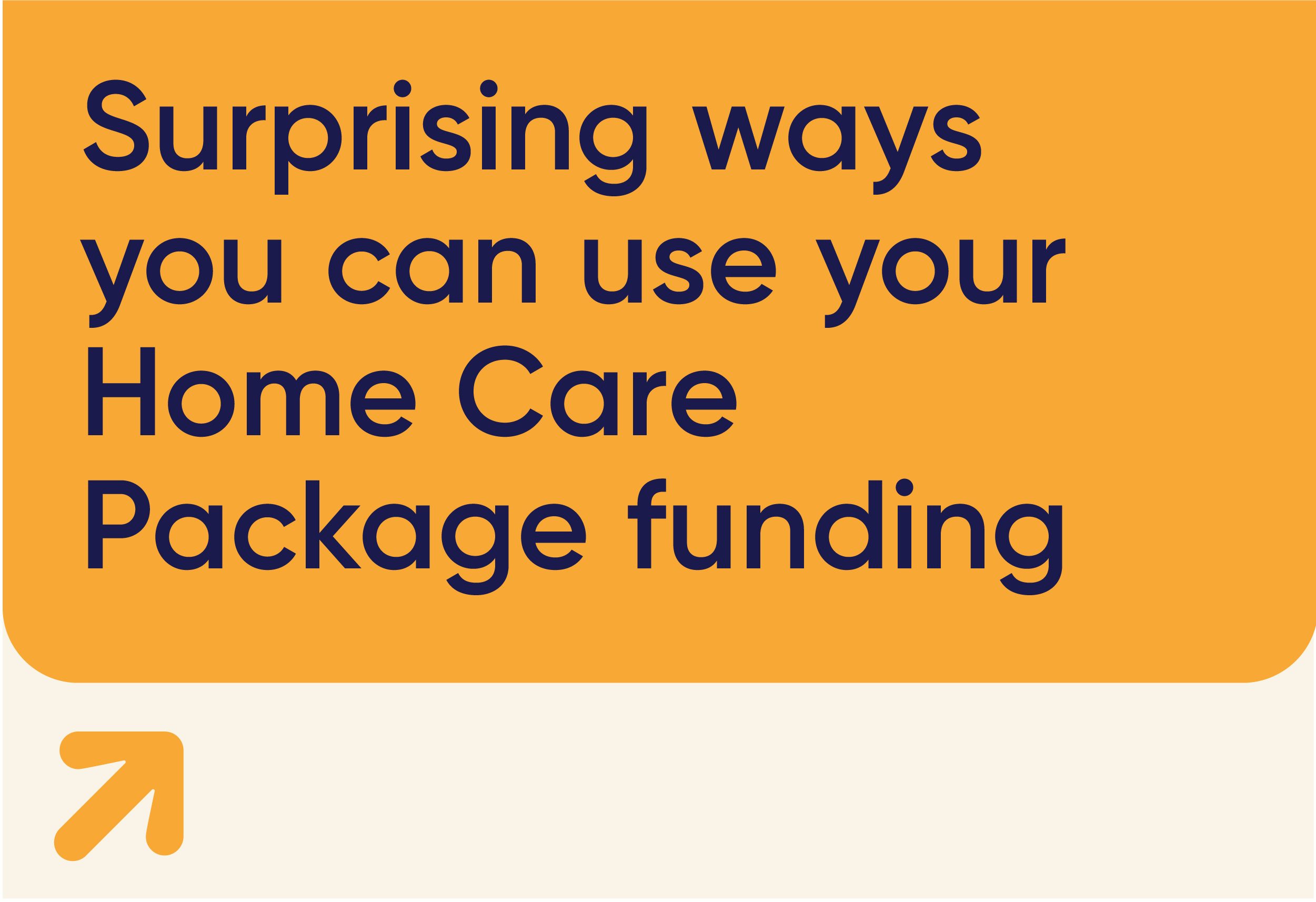Tips and advice

But the next, you could take a fall or experience a decline in your health – which may change everything.
The challenge is that when the time comes, getting help can be much more difficult and time consuming than you might think. That’s why you should plan home care support as early as possible.
This way you can skip the long lines for funding, and stress. And avoid reaching into your own pocket to cover unforeseen expenses. Let’s explore the ‘right’ time to make a call on home care support, how to get started – and what happens next.
You can't predict the future, but you can be prepared
Many people delay seeking home aged care support until they have a serious incident – often seeing aged care support as a last resort or for very unwell people.
For instance, they might trip in the bathroom and break their leg. Or they may go for a walk around the block and forget their way home. In both these examples, immediate and ongoing care will likely be necessary.
In other cases, it may be friends or family network who struggle to keep up with changes to your health – and they may delay seeking help until burnout has well and truly set in.
But without a Home Care Package already in place, support may be unavailable. This means you might have to dip into your own pocket to pay for care until you’re approved for funding.
 You can avoid this stressful situation by applying for a Home Care Package sooner rather than later. To get the ball rolling, you will need
to undertake an assessment to determine your eligibility. But be aware, just getting the assessor to pay you a visit at home to review
your situation typically takes 6-8 weeks.
You can avoid this stressful situation by applying for a Home Care Package sooner rather than later. To get the ball rolling, you will need
to undertake an assessment to determine your eligibility. But be aware, just getting the assessor to pay you a visit at home to review
your situation typically takes 6-8 weeks.
The signs to look out for
A Home
Care Assessor will look for things like whether you’re having trouble with day-to-day activities. Or if you’re at an increased risk of
falls or cognitive decline. They’ll also monitor for carer burnout because perhaps the person supporting you is struggling to keep up.
It is important to be clear and open during an assessment to avoid missing out on the care you need! Be sure not to sugar-coat or down play your circumstances. Instead, give an open honest account of what it's like on your worst day. This includes how your spouse or son/daughter might be managing as your carer.
Besides asking about your general health and wellbeing, the Assessor reviews four main categories including:
| Activities of daily living |
Falls risks |
Cognitive decline |
Carer burnout |
|
Finding tasks more difficult such as:
|
Indicators may include:
|
Earlier signs may include:
|
Assessor looks for things such as:
|
What many people don’t realise…
Yes, planning ahead for a Home Care Package is a smart move. And doing so will help you to avoid a lot of financial stress should something happen.
But did you know home care isn’t just about getting life back on track after a serious incident or decline in health? It’s also about improving your overall quality of life, and extending your years of living well and independently at home.
Anyone aged 65 or older (or 50 or older for Aboriginal or Torres Strait Islander people) can apply for funding.
This means you could have someone come to your home to cook your meals. Or to help change your linen – even if it’s just once a week. Here are some other services you might consider:
These services are designed to help you to maintain your independence. To live more happily. And to keep enjoying all of your favourite
things.
More helpful resources when considering Home Care

Beginner's Guide to Home Care Packages A free, easy-to-follow guide on eligibility, how to apply for funding and more. Get guide.

What you can spend your funds on can surprise Discover some of the more unexpected ways to improve
life at home. Discover.
 Which
kind of Home Care is best for you? Learn
which is the best value and right fit for you when choosing Home Care. Learn more.
Which
kind of Home Care is best for you? Learn
which is the best value and right fit for you when choosing Home Care. Learn more.
The waiting game
Applying for funding takes time. And you can easily find yourself stuck on the National Waitlist. In fact, it can take 3-12 months on average to get funding even after you've been approved for a package by the Assessor.
This presents a challenge for many people and their families. Particularly if your health has gone downhill quickly and you need support right away.
Granted, you may be able to manage some basic home care services yourself. (Like a gardener to maintain your backyard or a driver to get you to and from appointments.)
However, for more complex needs – like a nurse to help you shower in the mornings – or for regular support with meal preparation, things can quickly get out of hand. You could easily end up paying thousands of dollars. Just to get by.
You can read our Top 7 Survival Tips to make the waiting
game more manageable.
We also offer 2 hours of Free Care per fortnight for anyone on the National Waitlist, at no cost or obligation. Learn more

So, what exactly is involved?
Once you’ve decided to pursue a Home Care Package, and you’ve been granted funding by the government, you’ll need to arrange for a Home Care Provider to help plan and manage your health and personal needs.
This will involve a Care Manager coming to your home to review your personal situation.
They will then design a package to suit your needs – and introduce you to your Care Companion. At Age Up Health, this will be the same friendly faces every time, so you can feel completely comfortable with them in your home.
Your Care Companion may visit daily, weekly or less frequently – depending on your plan.
When should I review my level of care?
Once your care package is in place, a good Care Manager will check in regularly to make sure everything is running smoothly and that you are receiving the support you need.
They will also keep an eye out for any changes in your situation, or indications that you may need to adjust your plan.
Key signs that it's time to review your care level include:
The right Home Care Package Provider will communicate with you and your entire care network, including nominated family, friends and health
professionals. This will ensure your care is reviewed regularly and that your funding and support is adjusted accordingly.
Need support with your Home Care Package?
We’re here to help. Age Up Health provides packages that are designed to keep you happy and healthy at home, where
you belong.
Our services are simple.
Expect a single fee and the same friendly face each time. And rest assured that our packages are flexible enough that you can make changes whenever you wish.
Contact us today to find out more.
Or book a free 15-minute consultation with one of our consultants.
Contact us today to find out how we can support you and your loved ones.